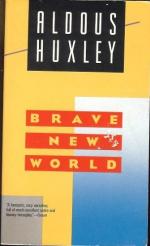|
|
Brave New World Author/Context
Aldous Huxley was an essayist and novelist whose reputation reached its peak in the 1920's. He excelled in not only his essays and novels, but also in many other genres including poetry, journalism, historical studies, travel works, screenplays, and short stories. Brave New World (1932) is probably his most well-known novel, though he did publish many other novels of intellectual and critical success such as Antic Hay (1923), Point Counter Point (1928), and Eyeless in Gaza (1936).
Huxley was born to a family of strong intellectual background in Laleham, England, on July 26, 1894. He was sent to preparatory schools for high-class children, and eventually made his way to the very reputable private school, Eton at age thirteen. His father, Leonard Huxley, taught and later worked and wrote for a publishing firm, and his mother, Julia Frances Arnold Huxley, founded a girls' school. His aunt, Mrs. Humphrey Ward, was a novelist, and his great-grandfather, Dr. Thomas Arnold, was an educational reformer. Perhaps his best-known relative is his great-uncle Matthew Arnold, who wrote the famous poem, "Dover Beach."
Huxley was the third of four children. His siblings were also noted for their intelligence, and his brother Julian became a highly regarded biologist. Yet this gifted household suffered a number of tragedies which would later shape Aldous' life and work. His mother Julia died of cancer in 1908 when Aldous was just fourteen years old. At age sixteen, Aldous contracted an eye disease called keratitis punctata, which left him nearly blind for eighteen months, ending his budding scientific or medical career. Aldous' early exposure to physical suffering, both his own and that of close family members, is apparent in his novels, in which he often explores the theme of conflict between human spirit and human flesh.
In 1914, Huxley's brother Trevenen hung himself. In writing of his brother's suicide, Aldous concludes it was his ideals that had driven him to take his own life. The catastrophic conflict between ideals and reality becomes another theme dominating Huxley's work.
While in college, he met his first wife, Maria, in 1919. They had a son, Matthew, and the same year, Huxley published his first book of short stories. Maria died in 1955, and in 1956 he married Laura Archera Huxley, also a writer.
Point Counter Point (1928) is one of his most complex novels, and it is the novel that established him as a best-selling author. Brave New World was to follow. Huxley began Brave New World as a result of his intrigue with the sciences, which he had studied extensively before the damage to his eyesight at age sixteen. He was concerned with the social and moral ramifications of advances in science, medicine, and technology. Huxley felt that those in power, controlling the use of these advances, particularly, officials in the government, were not adequately responsible. Although the novel can be read purely as science fiction, there is a deeper commentary reflecting Huxley's concern with technology and its place in society. The commentary on the potentially diverging paths of social and scientific progress continued into his later novels and essays.
Ultimately, Brave New World may have set Huxley on a pedestal. Critics have attacked Huxley's later works of fiction for a lack of positive characters, noting that the author is more effective at expressing discontent than approval. Other critics and scholars have defended his later works, claiming that the ideology and morality present in his novels place it outside of the field of fiction, and therefore it should not be scrutinized as such. Although he is not critically recognized as a literary great, Huxley remains well respected for the impact of his work, and for its incredible versatility in both style and form.
Bibliography
Huxley, Aldous. Brave New World. New York: Harper Collins Perrenial Classics, 1998.
Paulsell, Sally A. "Aldous Huxley." Dictionary of Literary Biography, Vol. 162. John H. Rogers, ed. Detroit, London, and Washington, DC: Gale Research, 1996
Thody, Philip Malcolm Waller, 1928- Aldous Huxley: a biographical introduction [by] Philip Thody. London: Studio Vista, 1973.
Trosky, Susan, ed. Contemporary Authors: New Revision Series, Vol. 44. Detroit, London, and Washington, DC: Gale Research,1994




